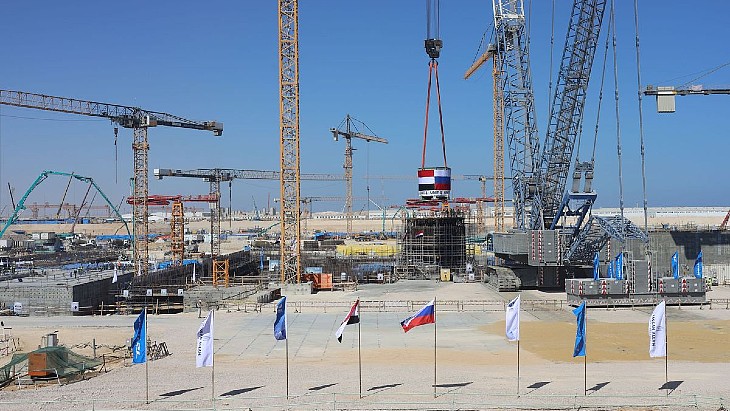The core catcher (also known as a melt trap) is a key bit of safety equipment - it is a container in the form of a cone made of thermally resistant steel which in the unlikely event of an emergency will securely hold the melt of the core and not allow radioactive substances to leave the containment of the reactor. It consists of several parts with a total weight of 480 tonnes.
First concrete was poured for unit 3 in May 2023, with the core catcher shipped to the site from Russia in July this year and the installation, which involved a team of 10 people using a Zoomlion ZCC 32000 crawler crane with a lifting capacity of 2000 tonnes, took place ahead of schedule.
ASE JSC Vice President Alexey Kononenko, director of the El Dabaa construction project, called it "another milestone for this year" which he said was a result of comprehensive teamwork and thanked "everyone who put their efforts into the achievement ... we are looking to the future with confidence" for construction of what he called "the safest and most up-to-date nuclear power plant in the world".
Amged El-Wakeel, chairman of the Nuclear Power Plants Authority of Egypt, said: “Egypt prioritises nuclear security and safety. The core catcher is one of the main elements in the safety systems of the El Dabaa nuclear power plant, reflecting the highest levels of nuclear safety to ensure the safe and continuous operation of the plant." He praised the hard work from both the Egyptian and Russian sides which had meant agreed timelines were being met.
El Dabaa will be Egypt's first nuclear power plant, and the first in Africa since South Africa's Koeberg was built nearly 40 years ago. The Rosatom-led project is about 320 kilometres north-west of Cairo and will comprise four VVER-1200 units, like those already in operation at the Leningrad and Novovoronezh nuclear power plants in Russia, and the Ostrovets plant in Belarus.
Rosatom will not only build the plant, but will also supply Russian nuclear fuel for its entire life cycle. It will also assist Egyptian partners in training personnel and plant maintenance for the first 10 years of its operation. Rosatom is also contracted to build a special storage facility and supply containers for storing used nuclear fuel. Construction of the nuclear power plant began in July 2022.





_13505.jpg)
_87975.jpg)
_67826.jpg)
_87695.jpg)





